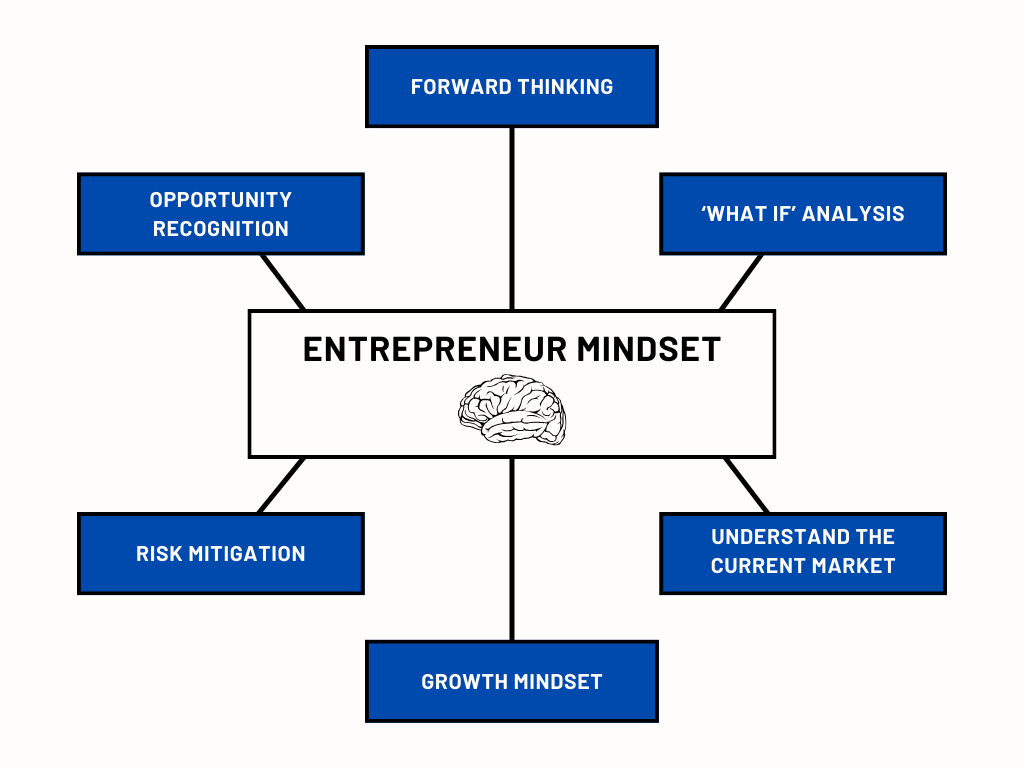Chapter 2: The Entrepreneurial Mindset
The Entrepreneurial Mindset
An entrepreneurial mindset is an awareness and focus on identifying an opportunity through solving a problem and a willingness to move forward to advance that idea. The entrepreneurial mindset is how entrepreneurs see the world. The entrepreneur evaluates everything in terms of their business. The business is always considered when making decisions. Most actions taken are for the benefit of the business, but sometimes it helps the entrepreneur adopt the appropriate mindset. This mindset becomes a way of life for them. See Figure 2.1 for an illustration showing the entrepreneurial mindset (OpenStax, 2020).
 Figure 2.1: The Entrepreneurial Mindset
Figure 2.1: The Entrepreneurial Mindset
Entrepreneurs often are predisposed to action to achieve their goals and objectives. They are forward thinking, always planning ahead, and they are engaged in “what if” analyses. They frequently ask themselves—“What if we did this?” or “What if a competitor did that?”—and consider what the business implications would be.
Most people follow habits and traditions without being aware of their surroundings or noticing the opportunities to become entrepreneurs. Because anyone can change their perspective from following established patterns to noticing the opportunities around them, anyone can become an entrepreneur. There is no restriction on age, gender, race, country of origin, or personal income. To become an entrepreneur, one needs to recognize that an opportunity exists and be willing to act on it.
Learn More
BetterUp has an excellent article on the entrepreneurial mindset and how to develop your own.
Entrepreneurial mindset: What is it & how to think like an entrepreneur
Many entrepreneurs start a new venture by solving a problem that is significant, offering some value that other people would appreciate if the product or service were available to them. On the other hand, some entrepreneurs begin their venture by providing a superior product, service, or both, that already exists. In any case, it is vital that the entrepreneur understands the market and target segment well, articulate a key unmet need (“pain point”), and develop and deliver a solution that is both viable and feasible. In that aspect, many entrepreneurs mitigate risks before they launch the venture.
Often, the entrepreneurial mindset includes futuristic ideas that shake up the normal, conventional processes that are grounded in experience over time. Tried-and-tested processes and products that have a proven history of success can be a formidable obstacle to new ideas. A new idea may even appear as impossible or outlandish, perhaps even an embarrassment to the steady and predictable practices established within an industry. This can create a dilemma: Do we try something new and unproven that lacks documented research? Sometimes, we must disregard our past successes and research to be open to new possibilities for success and failure.
An entrepreneurial mindset includes creativity, problem-solving skills, and a propensity to innovation. Open-mindedness is one characteristic that supports creativity, problem-solving, and innovation. Taking the time to explore new ideas, dream, reflect, and view situations from a new perspective contributes to the entrepreneurial mindset. Some innovations can lead to disruptions within the industry or even create a new industry.
One example of a disruptive technology is Airbnb, a company that threatens the established hotel industry by connecting personal resources to people who desire those resources. If one has a spare bedroom that they aren’t using, why not consider selling that space to someone who wants and needs it? We’ll learn more about Airbnb below.
Growth Mindset
According to Psychology Today, a growth mindset, developed by Stanford psychologist Carol Dweck, is the belief that one’s abilities and talents can improve over time. This contrasts with a fixed mindset, where individuals believe their capabilities are static and unchangeable. In studies, participants with a growth mindset disagree with statements like, “You have a certain amount of intelligence, and you really can’t do much to change it (Psychology Today Staff, n.d.).”
Embracing a growth mindset encourages openness to learning and success, whereas a fixed mindset can lead to negative self-perceptions and a reluctance to try new things.
Companies embracing a growth mindset see employees feeling more empowered, committed, and collaborative. In contrast, fixed-mindset companies experience more cheating and deception, as employees compete for recognition, according to Harvard Business Review (Dweck, 2016).
A growth mindset benefits entrepreneurs by fostering resilience, adaptability, and continuous learning, enabling them to view challenges as opportunities for improvement. It encourages creative problem-solving and calculated risk-taking, which are essential for innovation and long-term success. Additionally, entrepreneurs with a growth mindset can inspire their teams, creating a culture of continuous development and collaboration, while staying attuned to customer needs for higher satisfaction and loyalty.
Entrepreneur In Action
Being aware of your surroundings and the encounters in your life can reveal multiple opportunities for entrepreneurship. We always find areas for improvement in our daily lives.
For example, you might ask, “What if we didn’t have to commute to work?” “What if we didn’t have to own a vehicle but still had access to one?” “What if we could relax while driving to work instead of being stressed out by traffic?”
These types of questions inspired entrepreneurial ventures such as ride-sharing services like Uber, the self-driving vehicle industry, and short-term bicycle access in the free bike-sharing program in Pella, Iowa.

Entrepreneurial Spirit and Passion
Having an entrepreneurial spirit means possessing a mindset that enables entrepreneurs to tackle obstacles and face challenges with a can-do attitude. It could mean being passionate, purposeful, positive, bold, curious, or persistent (OpenStax, 2020).
The entrepreneurial spirit involves a passion for presenting an idea that is worthwhile and valuable and a willingness to think beyond established patterns and processes. Let’s look at an example.
Airbnb
The founders of Airbnb have a passion for supporting individual rights to rent out unused space. Why should the established model of hotels prevail? Why shouldn’t an individual homeowner have the freedom to rent out unused space and leverage that space into an income? The founders of Airbnb recognized that some people have unused resources and bedrooms that other people need.
Airbnb has succeeded in creating more flexible and affordable options in the space of the rapidly growing “sharing” economy. While entrepreneurial spirit is partly about fighting for individual rights and freedoms, there should be a balance between economic freedom and consumer protection. Some states and municipalities have expressed concerns regarding the regulations overseeing platforms such as Airbnb and similar services.
Airbnb had to keep in mind local laws and regulations in their quest to change those established patterns, or at least to offer alternatives to those established patterns.
Passion is a critical component of the entrepreneurial process. Without it, an entrepreneur can lose the drive to run the business. Passion can keep an entrepreneur going when the outside world sends negative messages or less-than-positive feedback. For example, if someone is truly passionate about starting an animal shelter because of their love of animals, they’ll find a way to make it happen. Their internal drive to help animals in need will spur them on to do whatever it takes to make the shelter become a reality. If they aren’t able to secure the financial resources needed, they could start small by fostering, for example.
The same is true of other types of startups and owners with similar passions. However, passion needs to be informed by the entrepreneur’s vision and mission—passion for the sake of passion is not enough. A clear mission statement will guide an entrepreneur’s passion and keep the business on track. Passion, vision, and mission can reinforce each other and keep the entrepreneur on the right track with the next steps for the business.
Some ideas might seem small or insignificant, but in the field of entrepreneurship, it’s important to recognize that for every new startup, someone else may recognize a spin-off idea that expands on the original idea. The opportunities for identifying new possibilities are endless. Consider possible spin-off ideas around the technology that is always changing. Creating spin-off ideas fits could be thought of as divergent thinking or brainstorming.
Let’s look at an example of a spin off idea based on technology.
Ring Doorbell
What if you could answer the front door from your phone? What if you could be there without needing to actually, you know, be there? These questions were asked by the founder of Ring. He took an everyday product – a doorbell – and combined it with existing video and app technology to create something new to the market (We’re Ring, n.d.).
Jamie Siminoff, the founder who was rejected on Shark Tank, started with a vision:
From that very first Video Doorbell all the way up to the latest 3D Motion Detection, everything we dream, design, obsess over and engineer is fueled by the desire to bring people closer.
What started in a garage in 2012 has grown into a profitable business that was sold to Amazon.com for $1 billion in 2018. Read more about how he started (Graham, 2021):
How Ring’s Founder Created A Doorbell Worth $1 Billion To Amazon
Pause and Reflect
An Entrepreneurial Mindset in Your Discipline or Field
Think about your own industry or area of study.
- What challenges come to mind? What causes frustration?
- How can these be turned into opportunities?
Key Takeaways
- Entrepreneurs focus on identifying opportunities by solving problems, viewing every decision through the lens of their business. This mindset becomes a way of life, characterized by action, forward-thinking, and “what if” analyses.
- Anyone can become an entrepreneur by changing their perspective to notice opportunities and being willing to act on them. Entrepreneurship is inclusive, regardless of age, gender, background or race.
- Successful entrepreneurs start by solving significant problems or improving existing products/services. Understanding the market, articulating unmet needs, and delivering viable solutions are crucial.
- The entrepreneurial mindset often includes innovative ideas that challenge conventional processes. Creativity, problem-solving skills, and open-mindedness support this mindset, leading to industry disruptions.
- Embracing a growth mindset, as defined by Carol Dweck, is vital for entrepreneurs. It fosters resilience, adaptability, and continuous learning, essential for innovation and long-term success.
- An entrepreneurial spirit involves passion, purpose, and persistence. Passion drives entrepreneurs through challenges, supported by a clear mission and vision.
- Companies like Airbnb illustrate how entrepreneurial ventures can disrupt established industries by leveraging unused resources and addressing regulatory challenges with passion and vision.
An awareness and focus on identifying an opportunity through solving a problem, and a willingness to move forward to advance that idea.
The belief that one's abilities and talents can improve over time.
Opposite of a growth mindset, this is where individuals believe their capabilities are static and unchangeable.
A statement which details why the business exists and the entrepreneur’s objectives for achieving that mission.
Divergent thinking, or lateral thinking, is about generating multiple creative solutions to the same problem.

